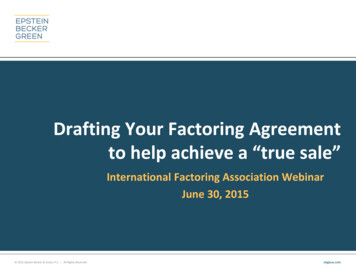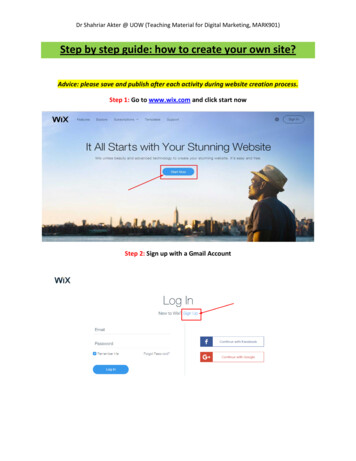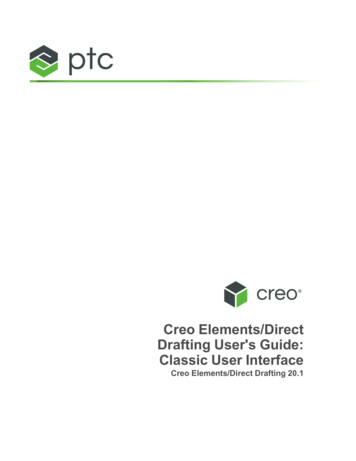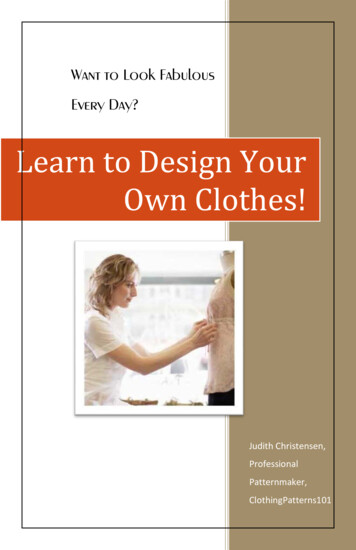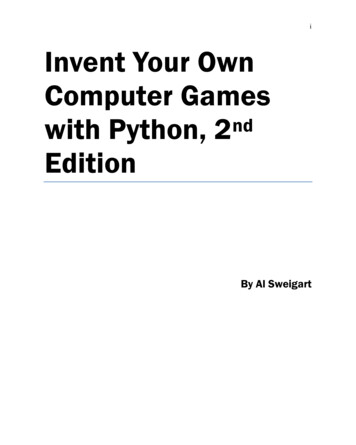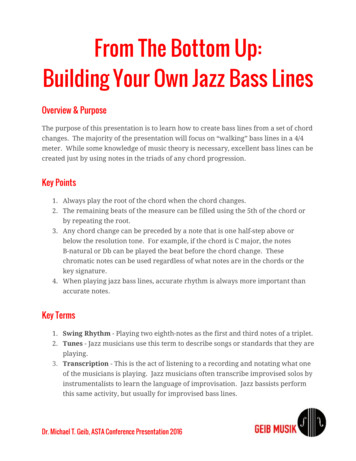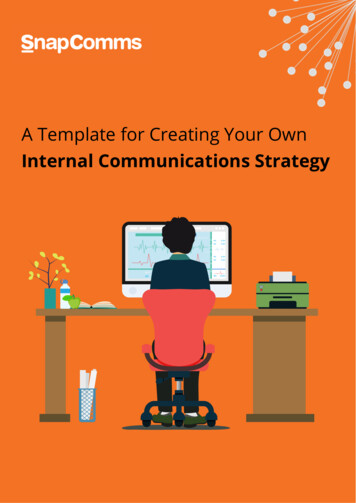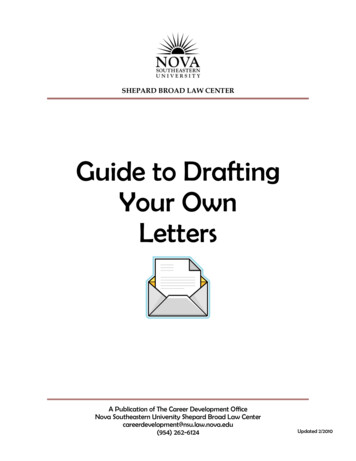
Transcription
SHEPARD BROAD LAW CENTERGuide to DraftingYour OwnLettersA Publication of The Career Development OfficeNova Southeastern University Shepard Broad Law Centercareerdevelopment@nsu.law.nova.edu(954) 262-6124Updated 2/2010
JOB SEARCH LETTER WRITINGInside this Guide1.2.3.4.5.6.7.8.IntroductionCover LettersThank You LettersLetter to Provide Additional MaterialsLetter to Request Informational MeetingAcceptance LetterJudicial Clerkship LettersSpecial Letters for Special SituationsI. IntroductionIn GeneralLetter writing is not only an important part of the job search process, it is also a skill thatpracticing attorneys use almost every day, throughout their careers. It is critical to master the skillof letter writing as early as possible. If you have difficulty with writing grammar or style, refer toStrunk and White’s The Elements of Style or Margaret Shertzer’s The Elements of Grammar andother resources for writing business letters. Both books are available at local bookstores andlibraries. Write simply, directly and briefly. Don’t turn a job search letter into a legal document.Use short, not complex or compound, sentences. Avoid jargon, multiple negatives, and thepassive voice. The ability to communicate clearly and effectively is a talent. Show that you havethis talent in your letters. Check your letter several times for grammar, spelling and punctuation.A poorly written letter will be tossed away, along with your chance for that job.PaperUse quality paper and matching envelopes for all of your letters. It should be the same paper thatyou use for your resume, so that when you send a letter with your resume, together they present aneat professional package. Except for a brief 30-word thank you letter, which may behandwritten, all business correspondence should be word processed. Use a professional-lookingfont that matches the font used in your resume. Print your letter on a laser printer. Even if you aresending other professional materials which do not include your resume, use the same paper.Business FormatsThere are generally 3 types of business letter formats: Block Format, Modified Block Format,and Semi-Block (Indented) Format. In the Block Format, type every line of the letter (EXCEPTFOR YOUR HEADING) flush with the left margin. In a Modified Block Format, the Date, theClosing, the Signature, and the Printed Name are all indented to the right half of the page (youdecide how far), and they all must line up with each other. In the Semi-Block Format, The Date,Closing, Signature, and Printed Name are all indented to the right half of the page (and they lineup with each other), AND the first line of each paragraph is indented.-2-
Envelopes and MailingMost quality paper comes with, or has available, matching envelopes. In most circumstances, youshould use these envelopes, with the address and return address printed through your laserprinter. If you are only enclosing a few sheets, such as your letter, resume, and even references,you should fold the paper into thirds for regular mailing in the envelope. If you are sending athicker package which may include a writing sample, you should keep the pages flat and sendthem in a manila envelope. Regular first class mail is most appropriate for job seeking, althoughfaxes and e-mails are gaining wider acceptance. There may be some instances, when you are veryclose to a deadline when overnight e-mail, or faxing is needed. You generally do not need torequest a return receipt or insure your materials.HeadingThe heading of your letter contains your contact information, and must include your name, addressand telephone number, at a minimum. It’s also a good idea to include a fax number, if you have one,and your e-mail address. Also, your e-mail address should not have a hyperlink attached to it.In most cases, you can copy the heading from your resume; then your documents will have aconsistent look. Be sure that the telephone number you give will always be answered, either by aperson or an answering machine. You won’t want to miss these calls. If you have an answeringmachine or voice mail, make sure the message sounds professional.Letter Writing Do’s and Don’tsDO:-Check every letter several times for typos, grammar, spelling and punctuation.-Ask someone else to review your letters for mistakes.-Customize every letter you send.-Use the active voice.DON T:-Write in all caps. It’s hard to read.-Abbreviate words. Take time to spell them out.-Use a post office box for your address. It makes you look transient.-Overuse “I”-Justify right margins.-Don’t send form letters. While you may develop a standard format to workfrom, each letter must be customized to the situation and the recipient.-Mark an envelope or letter as “personal and confidential” unless it truly is.Job search correspondence is rarely “confidential”.-3-
II. Cover LettersA cover letter should accompany every resume you send to a prospective employer, whether youare answering an advertisement or inquiring about potential openings. Cover letters provide anadditional opportunity to sell yourself and set you apart from other candidates. On the otherhand, a poorly written cover letter, or one with mistakes in grammar, spelling or punctuation,will doom your prospects for an interview.Resist the temptation to send the exact same cover letter to every employer. If you customizeyour letter to demonstrate that you understand the focus and current issues of a prospective employer,you’ll increase your chance to get an interview. For example, if a firm focuses on a particular area oflaw, has recently merged with another firm, or has received press coverage for its work with anotable client or project, demonstrate your knowledge of that fact. If possible, relate that fact to howyou would make a tangible contribution to the firm.The reader of your cover letter is more interested in their needs than yours. Focus on how yourskills and experience will be of benefit to the employer. Many cover letters mistakenly focus toomuch on the candidate’s objectives (salary, advancement, geography, etc.). If your letter says“I” too many times, redraft it to focus more on the employer’s needs.A cover letter should be limited to one page. Don’t rehash your resume. Instead focus on theskills, training or experiences that are best suited to the position or firm to which you areapplying. Also, mention items that may be of interest to the employer, but that are not mentionedin the resume.Remember, your cover letter is your first opportunity to distinguish yourself from otherjob seekers by highlighting those experiences and interests that make you a unique applicant.Your cover letter also plays a critical role in creating an employer's sense of you as a person. Usethe cover letter as an opportunity to convey more fully who you are than your resume does. Go intodetail about relevant aspects of background, instead of reiterating information on your resume.Finally, remember that your cover letter provides a sample of your writing to a prospectiveemployer. It must be perfect.-4-
Formatting Your Cover LetterPaper: Reproduce your cover letter on the same heavy bond paper that you used to print yourresume.Typeface and Font: Use the same typeface and 11-12 point font size for your cover letters thatyou used for your resume.Length: Generally, it should be no more than 3-4 paragraphs.Layout: A cover letter should conform to standard business formats (see Business Formats onpage 2). The information should appear in this order:The Heading(This is like your own letterhead, and should be identical to that of your resume.)[double space]The Date[double space]Full Name,Title,Firm/Organization, andAddress of Person to whom you are writing[double space]The Salutation:[double space]The Body of the Letter (with double spaces between paragraphs)[double space]Sincerely, (or other Closing of your choice)[leave four spaces - for your written signature]Your Name - typed[double space]Enclosure-5-
Writing the Cover LetterThe basic functions of the cover letter can be summarized by the three "I's":Introduce yourself to the prospective employerIndicate your interest and appropriateness for a specific positionInquire about the possibility of arranging for an interviewThe first step in composing your cover letter is to read over your resume and identify which ofyour experiences are the most directly pertinent to the position for which you are applying.Consider the personal strengths required by those experiences, the types of training they gaveyou, and the kinds of talents and skills you acquired in the course of them. Second, you will wantto draw on information you gathered from your research of the firm or the organization. Identifythe needs of the organization given its size, location, area of legal specialization, and so forth.The more you know about the prospective employer, the more effectively you can marketyourself as a potentially valuable contributing member of the organization. This leads directly tothe third step in drafting your cover letter – to express, in two or three sentences, how you coulduse the talents, skills and training you acquired through your previous experiences to contributeto the organization you have targeted.Since your cover letter will provide a sample of how well you write, vary your sentence structureto keep the employer interested. In other words, do not begin every sentence with "I (verb)." Themore customized your letter is, the better it will be remembered.The 5 Parts of a Cover LetterThough the contents will vary depending on the job search, a standard three to four paragraphformat for cover letters is both well-recognized in the professional community and extremelyeffective.1. The HeadingThis is your contact information. Put your name, address, phone, fax and e-mail address at thetop of the page. If a cell phone is the best way to reach you during the day, indicate that numberas well. If your address changes during your job search, send another resume and cover letterwith the new address, noting the reason for change in the new letter.2. The SalutationThe cardinal rule in sending out cover letters is to address your cover letter to a specific personwho will be charged with the responsibility for reading your letter. Usually, this person will beeither the person responsible for the hiring in each office, or the contact you have identified orwho has been identified for you. Do not address your letter to "To whom it may concern", or to"Dear Hiring Partner." The salutation in a business letter ends with a colon (:), as in "Dear Ms.Jones:". Show that you took the initiative to find out the person's name and title. If you do nothave a contact person, call the personnel office and ask, or locate the name of the hiring attorneyin any of several directories in the Career Development Office, or locate the name of a Novaalum currently working for the employer and address your letter to him/her.-6-
3. Paragraph #1 – The IntroductionThe first paragraph of your letter should serve to identify you (i.e., I am a first-year student atNova Southeastern University, Shepard Broad Law Center), and should explain why you arecontacting them (i.e., I am interested in a summer internship with your office). Where possible,mention who referred you to the job or how you learned about the organization, or about thespecific job opening, whether it was from a friend, a previous intern, an article in the paper, aspeaker on a panel, or a job posting. This is an important part of networking.Here are some examples of introductory paragraphs:The Basic Approach: I am presently a first year law student at Nova Southeastern University,Shepard Broad Law Center and I am writing to express my interest in an internship with [nameof firm] this summer.A Common Contact/Referral: I am a first year law student at Nova Southeastern University,Shepard Broad Law Center. Knowing of my interest in [insert type of practice area], [name ofcontact] suggested that I contact you with regard to the possibility of a summer internship withyour firm.A Posted Position: As a Florida native, with considerable practical experience in [insertprevious experience], I feel I am an excellent candidate for the internship that you advertised inthe NALP bulletin in January, 2010.After Researching the Firm/Organization: I have read a number of articles in the Wall StreetJournal about your firm's [insert].4. Paragraph # 2 and #3 – The ConnectionThe middle paragraphs should establish a logical link between you and the employer byexpressing the qualities and skills you have which match the needs of the organization.Communicate informed enthusiasm for the position. You should stress those experiences whichare most relevant to the position without merely regurgitating the descriptions in your resume.Focusing on how your skills fulfill the employer's needs will not only show that you recognizeyour own capabilities, but that you also have done research about and understand what theorganization does.5. The Final Paragraph - InquireThe last paragraph should thank the employer for his or her time and consideration. Remind thereader of your interest in and availability for an interview. You may consider a more aggressiveapproach by indicating that you will follow-up within the next few weeks to discuss thepossibility of arranging for a time to meet. Let out-of-town employers know if you will be intheir area at some time in the near future in order to facilitate scheduling an interview. Youshould always include information about how the employer can contact you. Remember tomention that your resume (and any other items you are sending) is/are included.-7-
GUIDELINES FOR A COVER LETTER(Putting the parts together)Your nameYour street addressCity, State (2-Letter abbreviation) ZIP CodePhone Numbere-mail (NO HYPERLINK)DateIndividual’s Name (Use “Esq.” or “Mr./Ms.” – Not “Mr. Jones, Esq.”)TitleEmployerStreet AddressCity, State (2-letter abbreviation – be consistent) ZIP CodeSALUTATION: Dear Ms. or Mr. (insert name of specific person):FIRST PARAGRAPH: Identify yourself, the position for which you are applying, yourconnection to the location, how you learned about the opening (i.e. if you were referred by anindividual or if you responded to a job posting).SECOND AND THIRD PARAGRAPHS: The Sales Pitch. This section should tell a brief storythat explains your background, and ends with why you are seeking work with this particularemployer. Establish a logical link between you and the employer by indicating your interest inthe position and the organization, and by explaining how your academic background andexperience makes you qualified. Using meaningful specifics based on your research about theemployer and its work, explain how your achievements and unique experiences make you a goodcandidate. This is an opportunity to highlight the skills, interests and experiences on yourresume, without restating such information verbatim.FOURTH PARAGRAPH: Request for action or promise to follow-up. Indicate your desire foran interview. Suggest alternative times and dates or indicate your flexibility. Indicate that youwill be in the city where the organization is located on a certain date and that you would like toset up an interview, or indicate that you will call on a certain date to set up a meeting. Make noteof any enclosures.LAST LINE: Expression of thanks.Sincerely,(your handwritten signature)Type your nameEnclosures(s): Resume, transcript, writing sample.-8-
Cover Letter Do’s and Don’tsDO:-Send a cover letter with every resume.-Write with the employer’s needs in mind.-Check and double-check spelling, punctuation, grammar and typos.-Be sure your address, phone numbers, etc. are current and correct.DON’T:-Rehash your name.-Use stuff, bureaucratic jargon or technical terminology that the reader may notunderstand.-Write more than one page.-Forget to sign your letter professionally – blue or black ink, no “ ” on I’s.The following pages have sample letters representing various situations. Do not copy theseletters verbatim! If you do, you risk having your letter look exactly like those of your fellowstudents and drawing negative attention when the lawyer reading it thinks, AOh, here s that sameNova Law School form letter again,@ as they throw it in the wastebasket. These are intended tobe for your guidance only and to serve as frameworks to create your own unique, personalizedletter. Be creative. And, make sure it’s letter perfect!-9-
Sample Cover Letter #1 (Block Format)Stanley Student123 Maple StreetFort Lauderdale, Florida 33312(954) 123-4567students@nsu.law.nova.eduAugust 29, 2009Ethel Employer, Esq.Good, Employer and Choice, P.A.7890 Broad StreetMiami, Florida 33123Dear Ms. Employer:I am a third year law student at Nova Southeastern University, Shepard Broad Law Center, andwill graduate in May 2010. I am very interested in the open attorney position that you listed withour Career Development Office this week.In planning my law school curriculum, I have taken a number of courses that would prepare meto make an immediate contribution to an employment law practice, including Labor andEmployment Law, Employment Discrimination, Employee Benefits, Alternative DisputeResolution, and an Interviewing, Counseling and Negotiating Workshop. I know that strongwriting skills are critical to a successful career in employment law, and I am pleased to point outthat I received an award for the best brief in my Lawyering Skills course. I am interested inbringing these skills to your firm.I welcome the opportunity to meet with you to further discuss my credentials and experience, andhow I can help meet the needs of your firm. Please contact me at your convenience to schedulean interview or to ask me any questions you may have.Thank you in advance for your time and consideration. I look forward to hearing from yousoon.Sincerely,Stanley StudentEnclosure-10-
Sample Cover Letter #2 (Modified Block Format)Stanley Student123 Maple StreetFort Lauderdale, Florida 33312(954) 123-4567students@nsu.law.nova.eduAugust 29, 2009Ethel Employer, Esq.Good, Employer and Choice, P.A.7890 Broad StreetMiami, Florida 33123Dear Ms. Employer:Frank Friend suggested that I contact you, as he thought that my skills and background may be agood match with your firm. I am a third year law student at Nova Southeastern University,Shepard Broad Law Center, and will graduate in May 2006. I am seeking a permanent positionafter law school, but would also be available for part-time work before graduation.I understand that your firm has recently taken on the defense of several major class actionlawsuits, which will create substantial demands on the firm’s resources for the next few years. Iam fortunate to have gained solid experience in complex litigation while working last summerfor Fighters, Scratchers and Litigators, P.A. In addition, my clinical work in law school gave meexperience in interviewing witnesses, organizing documents and preparing discovery requests. Iam willing to work long and hard, as evidenced by the fact that I worked full-time in ademanding job while earning my undergraduate degree.I will contact you next week about scheduling a meeting so we can further discuss myqualifications and the needs of your firm. Hopefully, we will find that Frank has some goodintuition! Please feel free to call me in the mean time. I look forward to talking with you.Sincerely,Stanley StudentEnclosure-11-
Sample Cover Letter #3 (Semi-Block Format)Stanley Student123 Maple StreetFort Lauderdale, Florida 33312(954) 123-4567students@nsu.law.nova.eduMay 7, 2009Ethel Employer, Esq.Good, Employer and Choice, P.A.7890 Broad StreetMiami, Florida 33123Dear Ms. Employer:I am very interested in the part-time summer position that you recently posted at NovaSoutheastern University, Shepard Broad Law Center. I am a second year student and have all of thequalifications your position requires.Your posting states that you are looking for a second or third year student in the top half ofthe class, preferably with experience in torts, insurance and pre-trial practice. Relevant to yourcriteria, I worked as an insurance adjuster for two years, before starting law school. In addition, I amin the top 30% of my class and, last semester, I earned an “A” in my Pre-Trial Skills workshop.I am available to start at any time, and would like to meet to discuss further how myqualifications would satisfy the needs of your firm. I will call you in a few days about arranging anappointment.Sincerely,Stanley StudentEnclosure-12-
III. Thank You LettersYou absolutely MUST send a thank you letter after every interview. In fact, you should send a thankyou letter after every job search contact, telephone call, informational meeting, referral or otherpersonal contact. Like your other documents, it must be grammatically correct, with no typos.Candidates have lost opportunities because of sloppy/careless thank you letters.The thank you letter should be mailed immediately --within 48 hours-- after the event. It should betyped on the same bond letterhead you used for your resume and cover letter. If you are more familiarwith the recipient, a brief 30 word thank you note may be handwritten on a plain note card, but handwritten letters are not preferred for business under these circumstances.Keep your thank you letter brief. Two paragraphs are plenty. If thanking for an interview, mentionthe date you interviewed and something that will remind the recipient of who you are, as they mayhave met several job candidates on the same day. This requires personalizing each letter. If you metwith several people at the employer’s office, send a letter to each of them, but vary the letters so theydon’t appear canned.Be sure to spell the recipient’s name correctly and use his/her proper title, if any. You should ask foreach interviewer’s business card, so you will have this information.Conclude your thank you letter with a final word of appreciation. If the letter pertains to aninterview, re-emphasize your interest in working for the employer.Do’s and Don’ts for Thank You LetterDO:-Send a thank you letter after every interview.-Try to personalize each letter to help the interviewer remember you.-Mail your letter within 48 hours after the interview.-Type the letter.DON’T:-Handwrite a job search thank you letter unless it is a brief note to a personalacquaintance.-13-
Sample Thank You Letter #1For InterviewStanley Student123 Maple StreetFort Lauderdale, Florida 33312(954) 123-4567students@nsu.law.nova.eduAugust 29, 2009Ethel Employer, Esq.Good, Employer and Choice, P.A.7890 Broad StreetMiami, Florida 33123Dear Ms. Employer:Thank you for meeting with me on Tuesday to discuss the opening at your firm, and myqualifications for the position. I was very impressed with the professionalism and dedication ofeach person I met at your office. I am more confident than ever that my background and skillsalign well with the needs of your firm.I was pleased to see that my business experience at Nova Industries and my law school coursework would enable me to make an immediate contribution to your team. It was also amazing tolearn that we had several mutual acquaintances from Florida State and, yet, we had not metbefore. It is, indeed, a small world after all!Thank you, again, for the interview. I look forward to hearing from you soon.Sincerely,Stanley Student-14-
Sample Thank You Letter #2For Informational MeetingStanley Student123 Maple StreetFort Lauderdale, Florida 33312(954) 123-4567students@nsu.law.nova.eduJanuary 4, 2010Ethel Employer, Esq.Good, Employer and Choice, P.A.7890 Broad StreetMiami, Florida 33123Dear Ms. Employer:I am writing to let you know how much I appreciate your taking the time to meet with meyesterday to discuss my job search. Your observations on the current legal market, and the fieldof family law, were invaluable and right on point.As you suggested, I have enclosed three original resumes. Please feel free to distributethem to any prospective employers that may need an attorney with my background andcredentials. In addition, I will contact Helen Helpful, as you suggested, in the next few days.Thank you again for your interest and guidance.Sincerely,Stanley StudentEnclosures-15-
Sample Thank You Letter #3For ReferralStanley Student123 Maple StreetFort Lauderdale, Florida 33312(954) 123-4567students@nsu.law.nova.eduNovember 29, 2009Ethel Employer, Esq.Good, Employer and Choice, P.A.7890 Broad StreetMiami, Florida 33123Dear Ms. Employer:Thank you for the referral to the job opportunity at Major Corporation, Inc. I immediately followedup with a cover letter and resume to George General Counsel. I hope to be hearing from him in thenear future, thanks to your thoughtfulness.Sincerely,Stanley Student-16-
IV. Letters to Provide Additional MaterialsFollowing an interview, or perhaps even prior to an interview, a prospective employer may askyou to submit a transcript, a writing sample, or references. You must include a letter with theadditional submission.Use the same letter head that you used for your cover letters. This letter will be very brief, justtwo or three sentences, so be sure that the letter is centered on the page properly and not on thetop third of the paper.Do s and Don ts for Letter to Provide Additional MaterialsDO:-Make it a formal letter to enclose documents.-Try to personalize the letter to help the interviewer or recruiter remember you.-Mail your letter as soon as possible with the enclosures.DON T:-Handwrite a brief note to accompany your documents.-Fold your enclosures into a tiny envelope if there are a lot of pages.-Delay in getting the requested documents to the employer.-17-
Sample Letter to Provide Additional MaterialsStanley Student123 Maple StreetFort Lauderdale, Florida 33312(954) 123-4567students@nsu.law.nova.eduAugust 29, 2009Ethel Employer, Esq.Good, Employer and Choice, P.A.7890 Broad StreetMiami, Florida 33123Dear Ms. Employer:In response to your letter of August 28, 2009, which requests additional information regardingmy application for employment with your firm, I have enclosed my transcript, a list of referencesand a writing sample for your review. As you will see, the writing sample is a legalmemorandum I wrote for my Lawyering Skills class this past semester.If you would like any more information or documentation, please let me know. I continue to havea great interest in the position and hope to hear positively from you in the near future.Sincerely,Stanley StudentEnclosures-18-
V. Letter to Request Informational MeetingNetworking is the best way to get a job. In fact, 80% of jobs nationwide are filled throughnetworking. The magic of networking comes when one person you know personally gives you two orthree contact names. You speak or meet with these new contacts, upon the reference of your personalacquaintance, and they give you a few more names. Each time, you seek information about the jobmarket and more names to contact, until you finally find a contact who has or knows about theperfect job for you. Remember, in an informational meeting, you are asking for information andcontact names, not a job. You will meet or talk with people who have no jobs to offer, but may beable to refer you to another person who has or knows of a job for you, or can tell you more about thespecifics of a field of law.When contacting people to whom you have been referred, it is better to write a short letter. Youshould mention the name of the person who referred you. Ask if you could have just fifteen to twentyminutes of their time for some guidance or suggestions on your job search. Tell them that you are notasking for a job, just their counsel. When you meet, be sure you don’t go over the time limit you set.Remember, this person is doing you a real favor, so don’t impose on their valuable time. Be sure tosend a copy of your request letter to the person who referred you. You do this by typing a “cc” on thebottom, at the left margin, and the person’s name. The “cc” refers to “carbon copy”, a holdover fromwhen copies were made with carbon paper. Although you will be printing your additional copies onthe laser printer, the “cc” designation is still proper.You will have to decide whether to enclose your resume. If you enclose a resume with a letter to astranger, they may automatically assume that you are looking for a job and not even read the coverletter. On the other hand, they may read both and be more able and ready to help you.Do’s and Don’ts for Letter for Informational MeetingDO:-Be sure to name the person who referred you.-Make it clear that you are looking for information, not a job.-Send a copy of the letter to the person who referred you.DON’T:-Make the letter too long.-Mention the name of a referring person with getting approval from that person.-19-
Sample Letter Requesting Informational MeetingStanley Student123 Maple StreetFort Lauderdale, Florida 33312(954) 123-4567students@nsu.law.nova.eduNovember 2, 2009Ethel Employer, Esq.Good, Employer and Choice, P.A.7890 Broad StreetMiami, Florida 33123Dear Ms. Employer:Charlie Contact suggested that I speak with you. Charlie and I worked together several years atOld Employer Inc. I am a third year law student at Nova Southeastern University, Shepard BroadLaw Center, and I am looking for guidance as I conduct a search for my first full-time legalposition. Charlie thought, considering my experience and areas of interest, that you are in anespecially good position to counsel me.I would greatly appreciate it if you could give me just fifteen to twenty minutes of your time. Iam not asking you for a job, just the benefit of your advice and suggestions. I will make thenecessary arrangements to be able to meet with you at your convenience; just tell me the time andplace that will work for you. Also, please let me know if you would like to
Aug 29, 2009 · -6 Writing the Cover Letter The basic functions of the cover letter can be summarized by the three "I's": Introduce yourself to the prospective employer Indicate your interest and appropriateness for a specific position Inquire about the possibility of arranging for an interview The first step in composing your cover letter
